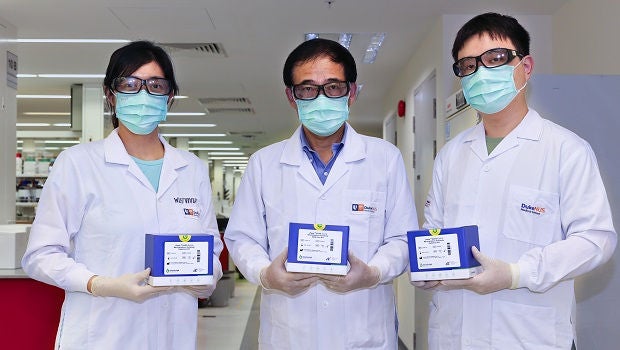HealthXchange will NEVER ask you to transfer money over a call. If in doubt, call the 24/7 ScamShield helpline at 1799, or visit the ScamShield website at www.scamshield.gov.sg.
US FDA approves Duke-NUS’ neutralising antibody test for COVID-19

On 6 November, the US Food and Drug Administration (FDA) granted its first emergency use authorisation for a blood test that can detect neutralising antibodies from past COVID-19 infections or vaccination.
The test, called cPassTM, was jointly developed by Duke-NUS Medical School, A*STAR’s Diagnostics Development Hub and biotech company GenScript. Unlike other neutralising antibody tests, cPassTM does not require live biological samples and can, therefore, be deployed in any clinical laboratory without the need for advanced biocontainment facilities.
“FDA approval of cPass as ‘the first test that detects neutralising antibodies (against SARS-CoV-2)’ is an important landmark in the fight against the COVID-19 pandemic. As the first and only commercial kit with such capability, this serological test will have wide-ranging applications and is another demonstration of the high quality of science and translational research that distinguish Duke-NUS and Singapore,” said Professor Thomas Coffman, Dean of Duke-NUS.
cPassTM is among 50 antibody tests that have been greenlighted by the FDA. But it is the only one to test specifically for neutralising antibodies. This type of antibody is believed to play a key role in conferring immunity against future infections.
“While we fully recognise that neutralising antibodies are not the only determinant for protective immunity, they are the only biomarker for immunity that we can practically measure on a large scale,” said Professor Wang Linfa from Duke-NUS’ Emerging Infectious Diseases Programme who led the work.
Knowing how immunity changes after infection or vaccination will be crucial to assess the effectiveness of any novel coronavirus vaccine.
“There are still many unknowns about what the presence of SARS-CoV-2 antibodies may tell us about potential immunity, but today’s authorisation gives us another tool to evaluate those antibodies as we continue to research and study this virus,” said Dr Tim Stenzel, Director of the Office of In Vitro Diagnostics and Radiological Health in the FDA’s Center for Devices and Radiological Health in the agency’s statement.
While further work will be needed to confirm the exact relationship between neutralising antibodies and protective immunity, the nod from the FDA is timely. With the authorisation, the test can be rolled out for further clinical and commercial testing ahead of any mass vaccination programme.
While this rapid test kit is poised to play a key role in COVID-19 management and governments’ exits strategies, it will also help scientists who are tracking the animal origins of the virus.
“What sets cPassTM apart, even more, is that it can detect neutralising antibodies in any species,” said Prof Wang. “Along with collaborators from around the world, we have obtained two grants from the World Health Organization to work on this important area.”
Get the Health Buddy App
© 2025 SingHealth Group. All Rights Reserved.













 Get it on Google Play
Get it on Google Play